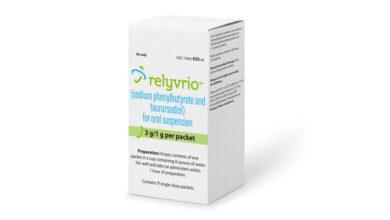GLP-1 drug may help with Parkinson’s disease, study reports

The booming class of GLP-1 drugs that includes Ozempic and Wegovy is not only effective for diabetes and obesity, but is also showing early potential to help with conditions involving the brain, like mental health disorders, Alzheimer’s, and even, as new study results suggest — Parkinson’s disease.
In a Phase 2 trial, patients with early Parkinson’s disease taking an older GLP-1 diabetes drug called lixisenatide experienced no worsening of motor symptoms over a year, in contrast to patients on placebo who did, according to the study, published Wednesday in the New England Journal of Medicine.
The difference between the groups — as measured by a test looking at someone’s tremors and rigidity — was small, almost but not quite reaching what is deemed to be a clinically significant difference. Still, the authors said they were encouraged that patients on the drug did not get worse, and the findings add to a growing body of research that suggests this class of medications holds potential as a new way of addressing Parkinson’s, a slow-moving, debilitating disorder that currently lacks any treatments that can halt disease progression.
With other drugs in the past, “we had so many positive data from animal models which never translated into the clinic when we tested the hypothesis in the patient,” said Olivier Rascol, one of the principal investigators and a professor at Toulouse University Hospital in France. But with this trial of the GLP-1 drug, “this is really a big signal in my view.”
Though the difference seen over one year was small, “the question now would be what would happen if the patients would take this drug for two years or three years or five years? Would there be an additional effect?” said Wassilios Meissner, the other principal investigator and a professor at University Hospital Bordeaux in France. “That is something future trials definitely need to address.”
The data supporting the use of GLP-1 drugs in Parkinson’s extends back several years. In 2017, researchers at University College London reported that Parkinson’s patients on exenatide, the oldest GLP-1 drug, experienced a small improvement in motor symptoms. This group is now running a two-year Phase 3 trial. In addition, epidemiological data show that the use of GLP-1 drugs and DPP4 inhibitors, a class of drugs that increases levels of the GLP-1 hormone, are linked to a lower rate of Parkinson’s compared with other diabetes treatments.
This new trial enrolled 156 patients across France that were taking stable doses of dopamine therapy for Parkinson’s. The authors chose to test lixisenatide in part because they could more easily obtain the drug, which was made, but now discontinued, by French drugmaker Sanofi. Lixisenatide also appears to be better at getting into the brain compared with newer GLP-1 drugs like semaglutide, the ingredient in Ozempic and Wegovy, and it’s not known if the newer medications may show the same promise in treating Parkinson’s, they said.
Lixisenatide was discontinued after “careful consideration of patient needs and standards of care,” and the decision was not related to any safety concerns, Sanofi said.
The trial was funded by the French Ministry of Health and Prevention and Cure Parkinson’s, a U.K. charity. Sanofi provided the drug and advised researchers on the characteristics of the medication, but otherwise was not involved in the trial.
Scientists hypothesize that GLP-1 drugs may help with Parkinson’s by reducing inflammation and protecting neurons from dying, which — if proven out — would be a critical new way of treating the disease. Parkinson’s is characterized by the progressive loss of dopamine-producing neurons, and while current dopamine-replacement therapies can help alleviate symptoms, they don’t stop the death of neurons and ultimately the worsening of disease.
The study authors said there were some early signs that lixisenatide may be helping protect neurons. At the end of the one-year trial, which showed that patients on placebo worsened by three points on a motor-symptom test while patients on the drug didn’t change, the researchers then had patients go completely off therapy and tested them again two months later. They found that there continued to be a three-point difference between the two groups, suggesting lixisenatide didn’t just mask symptoms, but possibly helped slow disease progression.
The researchers said they focused on motor symptoms because changes in other types of symptoms, like mood, cognition, and pain, are less easily detectable in early stages of the disease.
Scientists at Cedars-Sinai Medical Center in Los Angeles, though, recently conducted a trial with the GLP-1 drug liraglutide and found that patients on the treatment did experience improvements in non-motor symptoms. However, this trial was smaller and enrolled patients of varying disease severity, making it hard to compare with the new study, said Michele Tagliati, an author on the liraglutide study and vice chair of neurology at Cedars-Sinai.
Tagliati said he finds the new results “very exciting.” All the growing research looking at GLP-1 drugs is important, he said, since “we need mechanisms that go beyond helping the dopamine circuitry.”
Patients in the trial had gastrointestinal side effects that are commonly seen with GLP-1 drugs, like nausea and vomiting. This could be a concern for Parkinson’s patients in particular since they’re older, said David Standaert, chair of neurology at the University of Alabama at Birmingham who wasn’t involved in the study.
None of the major pharma companies in the GLP-1 space, like Novo Nordisk and Eli Lilly, are currently testing the drugs in Parkinson’s, though Novo is running two Phase 3 trials of semaglutide in Alzheimer’s.
It’s not clear if lixisenatide will continue to be available to researchers. Sanofi said “we are pleased to see the positive outcomes of this study,” and “we are open to a discussion with the investigators of the study on providing support for their next phase of research.”
Rascol, one of the principal investigators, said the results call out for further study: “It would be very important that Sanofi keeps supporting this kind of initiative and would not abandon the field.”



